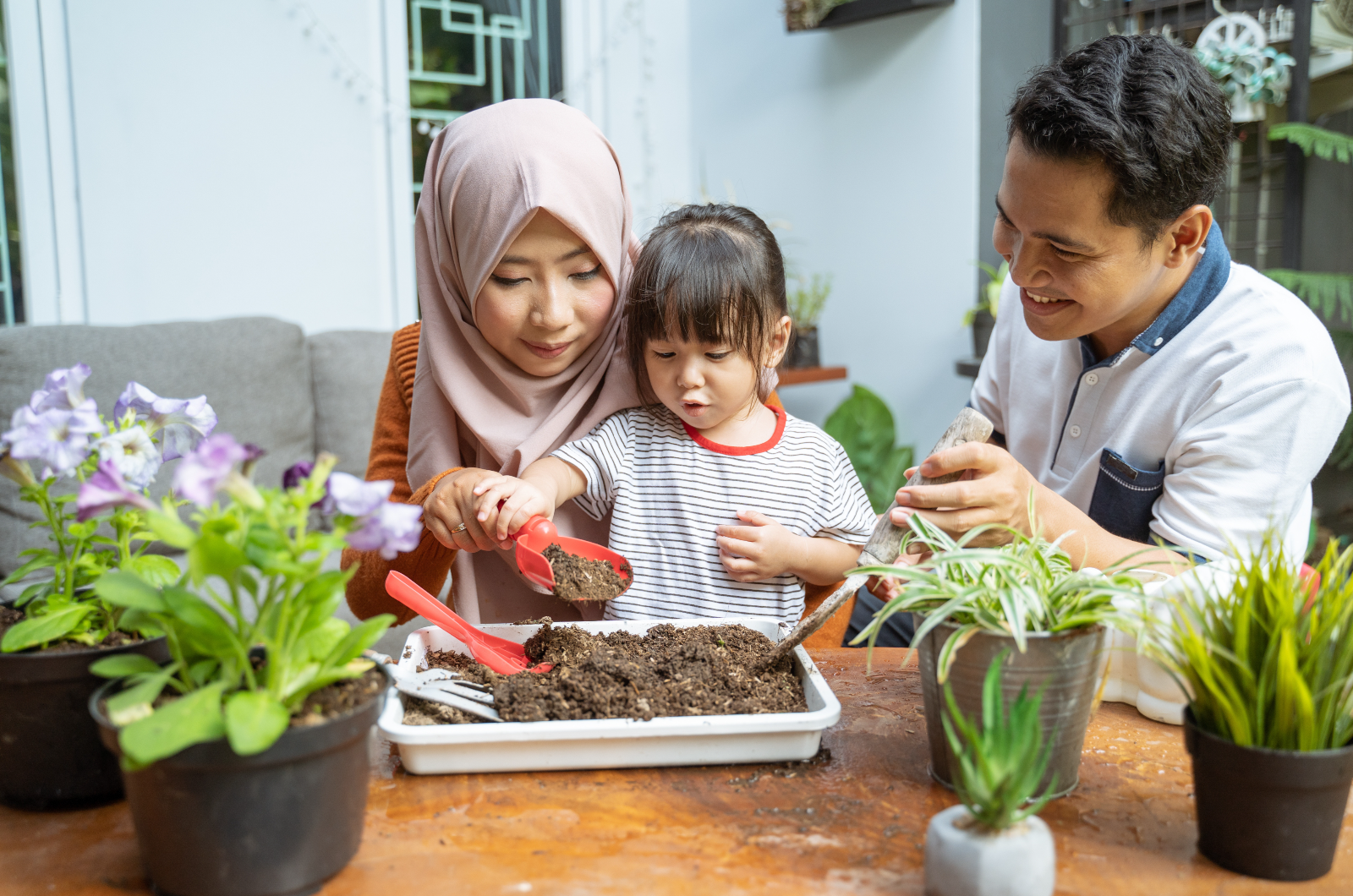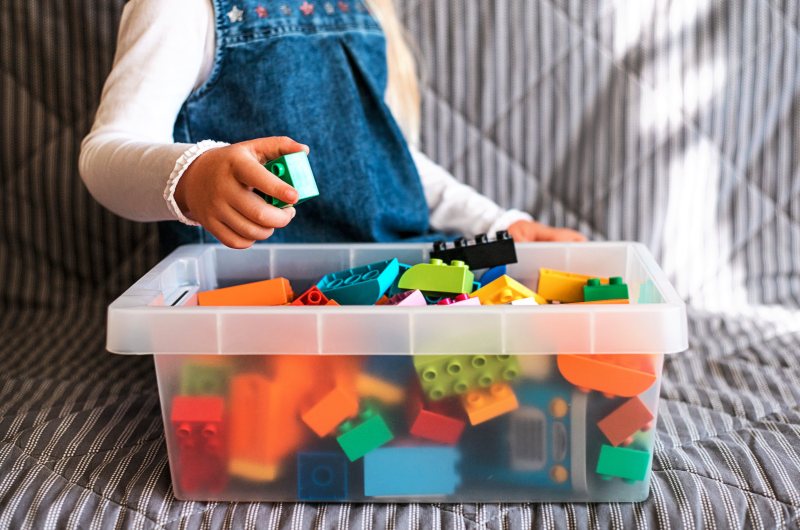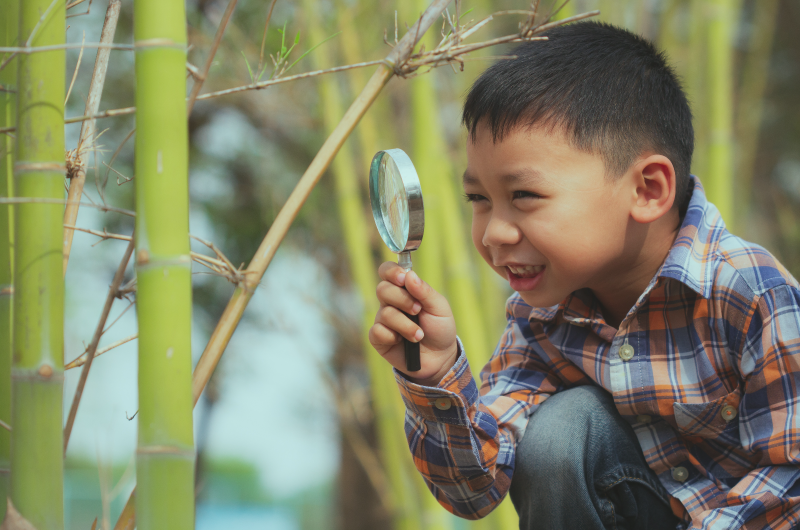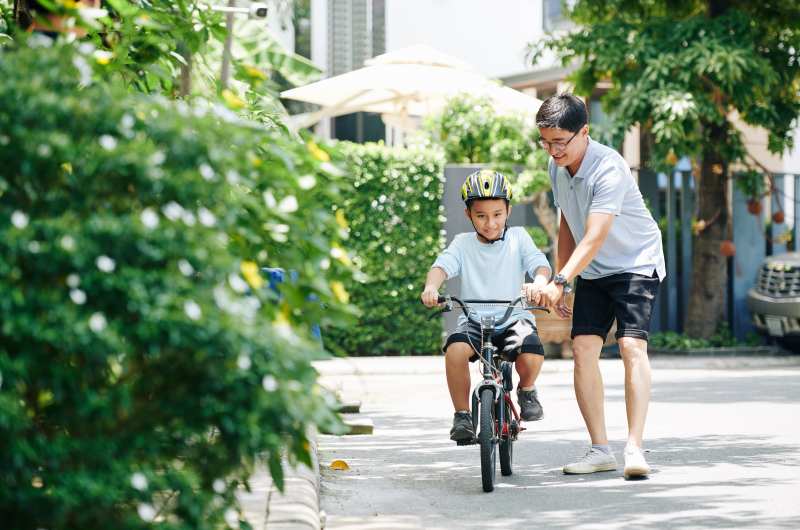
Essential Skills Children Need
Life skills contribute to mental well-being. Prepping your child with essential life skills will help pave the way towards a brighter future for them.
Although we are all born with the natural instinct to learn, each of us grow and develop at a different rate. By the age of 5, children learn through mental, physical and emotional stimulation, and most of their learning will be through play.1

Children’s development are categorised into 4 functions - physical, cognitive, social and emotional, and communication.
Children go through various stages of development, acquiring essential physical skills and behaviours such as moving, seeing, hearing, communicating and interacting with other people as they learn to engage with the world around them. These are the skills that they need to practise every day as they develop.
Brain connections are instrumental for these developmental milestones. Children’s brains grow rapidly in their early years, so it is important for parents to support their brain development during this time to ensure that they hit their development milestones accordingly. Here are some of the activities you can do with your little ones:
- Sensory and communication development: time fun – touching, singing, smiling and massaging.
- Motor development – crawling, walking and exploring; kicking; and grasping things.2
- Sensory experience – food play (introduce texture and taste - feed their curiosity), gardening and water play.

- Sense of smell – smelling the flowers, spices in the kitchen, etc.
- Kitchen fun – chat, play with pots and pans, cooking experiments, etc.
- Conversations – describe household chores mummy and daddy are doing, shapes of things in the house and show directions around the house (left, right, upstairs, downstairs, etc.)
- Multi sensory learning – hands on activities e.g. cook and bake combining learning maths and chemistry; watching documentaries to stimulate brain regions for visual and auditory perception; move around while learning; music while playing blocks; and doodle while listening to audiobooks.2
There is so much you can do to support your child’s brain development so he will master the life skills needed for a holistic development.
Essential Skills Every Child Should Learn and Develop
When you become a parent, your priorities automatically shift towards your child and his future. It’s only natural for you to want to provide the very best of everything for your little pride and joy. We’re happy to tell you that you can start right away from the day you become a parent, and guess what? You don’t really need physical things to provide your child with the best start in their life. What you need is lots of love, effort, time and attention, because what you’re going to do is help your child develop essential skills that are beneficial for their future success.
These are the 7 essential life skills your child should learn and develop, according to the groundbreaking book “Mind in the Making: The Seven Essential Life Skills Every Child Needs” by Ellen Galinsky, chief science officer at the Bezos Family Foundation and executive director of Mind in the Making:
1. Focus and self-control
What does it mean?
We’re living in a world overloaded with information and full of distractions. This is a skill that can help children achieve their goals, because it trains them to pay attention (focus); resist automatic response (self-control) so they will think before they act; remember what they need to know in order to use the information (working memory); and think flexibly (cognitive flexibility).3
How can parents help?
Daily routine:
Create an organised home: Show your child where and how to organise their shoes, toys, books, etc. Turn tidy up time into a game, e.g. “Where do the shoes go?”, “I Spy” and anything fun you can think of! Activities like these help them to focus and pay attention. Also, slot in Slow-down time - reading, listening or playing music and puzzles are good ways to encourage calmness and focus.

Learning creatively:
Work your child’s memory by improvising story time, e.g. stop in the middle of the story and ask your child to predict what is going to happen next, or leave a word out when you’re singing a song and get your child to sing the missing word. Games like Musical Chairs and Hide and Seek are great to help them practise self-control.
Strategising:
If your child often gets agitated when he has to wait in line or take turns with something, encourage him to come up with his own plan on how to manage the situation. This helps to develop your child self-control skills. When they make mistakes, encourage them to try again so they will learn that making mistakes is natural and part of learning and growing up.
2. Perspective-taking
What does it mean?
Thinking about how others think and feel. This is not merely about empathy-building, but it goes way beyond to facilitate a child in building positive relationships with less conflict in the future. With this skill, children learn to remember how others might respond (working memory); hold back their thoughts to understand others’ perspective (inhibitory control); view situations in different ways (cognitive flexibility); and observe the thoughts and feelings of others (reflection).3
How can parents help?
Daily routine:
Encourage your child to express his feelings or thoughts about any situation and explain how other people might think or feel differently about it. This exercise opens up their minds and builds on their perspective-taking skill.
Learning creatively:
Discuss experiences and feelings of characters in stories. This teaches them to learn to appreciate another’s point of view and others’ world views.
Strategising:
Help your child to use words to express feelings instead of acting out physically. Assist him to resolve a conflict with another child by talking and discussing. Support them to listen to others in a conversation.
3. Communication
What does it mean?
The ability to understand and communicate with others. Children require personal interactions to build healthy social-emotional skills. Their communication skills continue to develop as they grow and learn. Learning communication skills teaches children to pay attention to what they want to communicate (focus); think about how others would understand what they are communicating (cognitive flexibility); and use a different way of expressing themselves, especially if the initial approach wasn’t communicated effectively (inhibitory control).3
How can parents help?
Daily routine:
Listen and respond to your child attentively; what do they want to communicate? Coach them how to say it effectively using appropriate words and expressions. They will learn to be as sensitive as you are and develop social-emotional skills in interacting with others.
Learning creatively:
Acting is a fun way to build communication skills. You can get your child to act out a scene from his favourite story or movie, retell a story in his own way, and play sports or games that require communication such as football, show and tell, charades, etc.

Strategising:
Encourage your child to think before saying or doing something, and consider how others might react to their words or actions. Help them understand the importance of listening and taking turns to talk in a conversation.
4. Making Connections
What does it mean?
The fundamentals of learning lies in this very skill. This skill enables you to see the connections between contrasting things. For example, how a symbol - letters, numbers and words - is a symbolic representation of real objects. When making connections, children learn to picture what they know (working memory); recognise similarities and differences (cognitive flexibility); and categorise things accordingly (inhibitory control).3
How can parents help?
Daily routine:
Rationalise how different things in the world are related based on functions and purpose. Explain to your child why certain household items are made of wood, plastic and glass; why we wear different clothes for different weather and so on. During mealtime, ask your child how many people are eating together and how many plates should be on the table, then show the symbol for that number. You can also bring your child grocery shopping and get him to point out 3 items and tell you the similarities or differences between them.
Learning creatively:
Help your child to make abstract connections by reading a story or watching a film, and discussing how a certain scene reminds you of a real experience (from the scene or words spoken). This trains them to make meanings of things for different people in different situations. It also builds compassion and feelings of gratitude. For music lovers, play “guess that song” - clap the rhythm of a song and have your child guess the title or sing the song. Do you see the connection? :)
Strategising:
When your child makes a mistake, talk to him about it - ask why he made the mistake and what he can learn from it. Your child will learn to connect the dots and find a solution.
5. Critical Thinking
What does it mean?
Learning to analyse information, make choices and decisions. This skill enables you to use what you know to search for information (working memory); digesting information in different ways to have a deeper understanding (cognitive flexibility); and not reacting automatically and reusing old information, but utilising information you have acquired (inhibitory control).3
How can parents help?
Daily routine:
Encourage your child to brainstorm ways to solve a conflict, e.g. an argument with friends. Teach them to state the problem, list down solution ideas, analyse the ideas to see which one works the best for everyone and finally, try it out. If it doesn’t work, try another idea. This practice teaches your child problem-solving skills.
Learning creatively:
Pretend play is great to enhance your child’s critical-thinking skills. Introduce games that involve problem-solving, e.g. detectives solving mysteries, treasure hunts, etc. At story time, pause when you reach a conflict and ask your child to predict what is going to happen and how to solve the issue. This sharpens your child’s imagination and encourages him to find thoughtful solutions.

Strategising:
When your child asks an obvious question, instead of answering right away, dig into his mind a little by asking if he knows how to search for the answer. You can guide them by asking questions, referring to books or the web, experimenting and so on. Encourage them to evaluate the answer rather than accepting it blindly.
6. Taking on Challenges
What does it mean?
Being resilient by learning to overcome stressful situations proactively. Courage to try new skills, accept failures and bounce back stronger. With this skill, children learn to control their reactions (inhibitory control); reflect on the situation (reflection); and be flexible in finding solutions to the problem (cognitive flexibility).3
How can parents help?
Daily routine:
Encourage your child to try something new when he seems ready. Children will accept new challenges as long as they feel safe, so allow reasonable risks, e.g. riding a bike, skating, climbing a tree, riding a bike, tying shoe laces and so on. Acknowledge and praise success, but focus more on effort rather than achievement. This helps your child to build resilience, determination and persistence.

Learning creatively:
When your child’s art project doesn’t turn out as expected, encourage him to improvise instead of immediately giving up. Think of creative ways to “repair” the artwork. Some children do not accept losses well, so in such situations, help them manage their feelings and teach them that winning isn’t everything, but it’s the effort that truly counts.
Strategising:
As children are still learning many new things every day, they might stumble upon situations where they feel defeated and not know how to get out of the sticky situation. Encourage your child to seek help from people they trust. Help your child understand that different situations might call for different solutions, so guide him on new ways to solve his current issue. Remind your child that his attitude matters, so when facing a problem, the way forward is to keep trying and improving.
7. Self-directed, Engaged Learning
What does it mean?
Setting goals and strategies to adapt to change as the world changes. This enhances children’s curiosity and passion for learning, which will help them in realising their potential. This skill trains your child not to go on auto-pilot mode, but instead reflect upon experiences, set goals and work toward them (inhibitory control); and be flexible in accepting new ways of learning (cognitive flexibility).3
How can parents help?
Daily routine:
Be a model to hunger for knowledge and expose your child to new experiences and information to help him broaden his knowledge and be passionate about learning. Let your child explore his interests and guide him to set his goals or dreams based on them. Children learn the most when they are happy and feel safe, so create a safe space for your child to learn and build on his strengths instead of focusing on his weaknesses. Let him feel in charge of his own learning.
Learning creatively:
Provide reading materials, art and craft supplies, music education/musical instruments and games at home. Limit tv and electronic devices. Encourage creativity, and allow some mess because it’s a sign that your child is having fun, exploring and exercising his creative mind.
Strategising:
Involve your child in family activities that can improve his social, emotional and cognitive capabilities. For example, have your child join you in organising his birthday party. Discuss menu, decoration and game ideas, but let him take the lead. This way, your child will learn how to provide new ideas by making use of all the information, knowledge and skills he has obtained, and at the same time be responsible for his own learning.
Nutrients That Facilitate Children’s Learning Experience
Building brain connections begins with a nutritional foundation. The appropriate nutrients can help support children’s brain development and facilitate their learning experience.
Research has shown that key nutrients like DHA and sphingomyelin, are the force behind brain connections.
If you haven’t heard of sphingomyelin, here’s a little background info:
- Myelination is one of the major processes that guides brain development in early childhood onwards.4
- Myelination happens when a substance made of fatty lipids and protein called myelin, coats the nerve fibre (this is where messages are transmitted between neurons) in the brain. This coating is called the myelin sheath, and sphingomyelin is a phospholipid that is an integral component of the myelin sheath.4
Sphingomyelin is the backbone of myelination and supports efficient brain connections.5-7
S-26 GOLDⓇ PROGRESSⓇ is now formulated with innovative ingredients to provide our most advanced formulated milk for children.
S-26 GoldⓇ ProgressⓇ is specially formulated with sphingomyelin, DHA, 2’-FL and oligofructose. Support your child’s growth with appropriate nutrition and sufficient rest to help him Think Quick and Learn Fast.
References:
- https://www.healthdirect.gov.au/developmental-milestones
- https://www.thehomeschoolmom.com/7-simple-ways-to-boost-your-child’s-brain-power/
- https://www.mindinthemaking.org/life-skills
- Salzer JL, Zalc B.Curr Biol. 2016;26:R971-R975.
- Henríquez-Henríquez MP, Solari S, Quiroga T, Kim BI, Deckelbaum RJ, Worgall TS. Front Neurosci. 2015;9:300.
- Tanaka K, Hosozawa M, Kudo N, et al. Brain Dev. 2013;35(1):45-52.
- Deoni S, Dean D 3rd, Joelson S, O’Regan J, Schneider N. Neuroimage. 2018;178:649-59.
DISCLAIMER: The content is for informational purposes only and is not intended to be a substitute for professional medical advice, diagnosis, or treatment. Always seek the advice of your health professional with any questions you may have regarding a medical condition. Due to unique individual needs, the reader should consult health professional to determine the appropriateness of the information for the reader's situation.